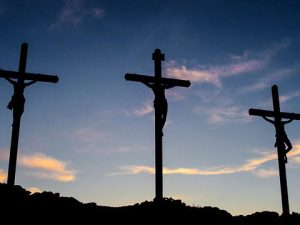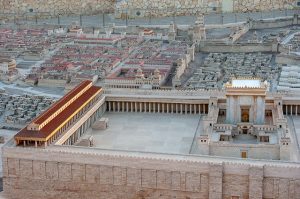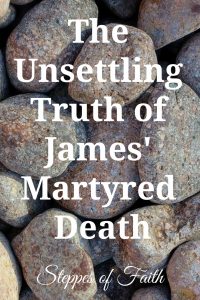
“Let every man be swift to hear, slow to speak, slow to wrath.” James 1:19
James was Jesus’ half-brother and full brother to Simon, Joseph, Judas (author of the book of Jude in the New Testament), and two sisters. During all of Jesus’ ministry, James thought Jesus was peculiar and maybe even a bit crazy. But after witnessing his brother’s resurrection, suddenly he changed his mind. He eventually went on to be a great defender of Jesus, the Jerusalem church, and Jewish law. And, he prayed so much the people nicknamed him James the Just.
It should be a beautiful story of a brother who realizes his mistake, accepts that Jesus is the promised Christ, and dedicates himself to defending the early Christian church. However, not everyone thought it was a beautiful story. James created some enemies along the way to becoming the leader of the church, which creates some controversy about how he died.
James’ Denial
It is not explicitly known if James or any of Jesus’ siblings knew who Jesus was as they grew up together. It may have been a secret kept completely between Jesus and Mary, or it might have been that everyone in the family knew about it but largely denied it (except for Mary and Joseph, of course). After all, if someone told me my big brother, Ron, was the Messiah I would probably laugh in their face. And, let’s not forget that it had been 400 years since God gave any message to any prophet. It’s pretty unbelievable stuff.
Even throughout Jesus’ ministry, James thought the stories of Jesus’ miracle healings were just stories. In his mind, they couldn’t possibly be true. He accepted that his brother was a good teacher, but that’s all.
Some of his denial may have come from his strict, orthodox Jewish beliefs. Like other Jews, he may have been expecting the Messiah to be a military general who would sweep in and conquer the Romans completely, not his brother. Not the kid he grew up playing stickball with and walking to school together.
The Awakening
But then came the day of Jesus crucifixion. James was still skeptical, and it seems he harbored some animosity toward his brother, enough that he didn’t attend the crucifixion (John 19:25).
Jesus was not oblivious to this. As the oldest brother, it was His responsibility to make sure someone properly cared for Mary after His death, but Jesus didn’t hand that responsibility to any of His brothers. He gave that honor to John, His closest friend (John 19:26-27).
It wasn’t until a week after Jesus’ death that James finally overcomes his denial. Jesus appears to him and the disciples as they hid in a room from the Jews (John 20:19; 1 Corinthians 15:7). Seeing his brother alive again compels him to join the disciples, which we learn later in Acts 1:12-14 where they all gathered in the upper room to pray and wait for the Holy Spirit to come after Jesus’ ascension to heaven.
It was because of these experiences that James dedicated himself even more to the church, but this time in defense of his brother, the Christ.
Growth and Promotion
James became very well-known and influential in Jerusalem. Some say he was the only one allowed to enter the temple alone to pray, and because he prayed so often, people joked that he had “camel knees.”

His constant, daily prayer is why he was called James the Just. As far as everyone was concerned, no one was more righteous than him.
He was a very devout Jew and held tight to Jewish law, but he also embraced his brother’s teachings. Still, he may have had regrets about how he treated Jesus.
Thirty years later when he wrote his epistle, he begins by saying, “James, a bondservant of God and of the Lord Jesus Christ….” What’s important to note is that he identified himself more of a servant of Jesus and less as his brother. Their brother, Jude, remarked the same way calling himself “a bondservant of Jesus Christ and a brother of James (Jude 1),” not Jesus.
James commonly spoke about Jesus when he preached, and the people loved it. But the temple priests did not. They still did not believe that Jesus was the Messiah. Despite that issue, the early church members promoted James to Lead Pastor of the Jerusalem church. The priests accepted his new position, but they didn’t like it.
He became widely known and very powerful in the early church. He likely even led a few Roman rulers to accept Jesus as God. Of course, this made the Pharisees even more upset for they feared they would lose their power and influence from people leaving the temple and joining the Christians instead.
So, the Pharisees plotted to kill James just as they did Jesus.
James’ Proclamation
Although there is no Biblical record, according to the first-century Jewish historian Josephus, James was summoned by the Pharisees in A.D. 62 and accused of breaking Jewish law at the request of the outgoing high priest, Ananus. No one knows why Ananus wanted James to die other than what Josephus recorded, which was James “was of an exceeding bold and reckless disposition.”
James’ punishment was that he be stoned to death unless he publicly renounced Jesus. This was approximately two years after James wrote his epistle.

A fourth-century church historian named Eusebius provides more information about what happened next. According to Ecclesiastical History, he states that the scribes and Pharisees took James to the pinnacle of the temple (the same pinnacle where Satan tempted Jesus) and “demanded that should renounce the faith of Christ before all the people…”
Of course, James couldn’t possibly do that, so he “declared himself fully before the whole multitude, and confessed that Jesus Christ was the Son of God, our Savior and Lord.” One source states that James said, “Why do you ask me about Jesus, the Son of Man? He sits in heaven at the right hand of the great Power, and he will soon come on the clouds of heaven!”
Notice that James uses the same words Jesus did in Mark 13:26.
An Unjust Killing
James’ proclamation enraged the Pharisees so much they pushed James off the pinnacle! Miraculously, he survived. What’s even more astonishing is that he rose to his knees and began praying for the Pharisees: “I beg of you, Lord God our Father, forgive them! They do not know what they are doing.” Here again, notice James’ use of Jesus’ words (Luke 23:34).
The Pharisees on the ground began to stone James, but one priest begged them to stop by saying, “Stop! The righteous one is praying for you!” But it was too late.
Second-century historian, Hegesippus, states the event this way:
“…They went up and threw down the just man [from the temple height] and said to each other, ‘Let us stone James the Just.’ And they began to stone him, for he was not killed by the fall, but he knelt down and said, ‘I entreat thee, Lord God our Father, forgive them, for they know not what they do.’ One of them, who was a fuller [launderer], took the club with which he beat the clothes and struck the just man on the head. And thus he suffered martyrdom (Biblical Archaeology Review, 2002).”
The Jews were horrified! The incoming high priest was on his way to Jerusalem at this time, and many of the townspeople ran to meet him complaining of what Ananus was doing. Unfortunately, the new high priest was too late. The only thing he could do was remove Ananus immediately, which wasn’t enough rectification for the crowd.
As a result, according to some, the Jews began to rebel against the Pharisees in what became the first Jewish-Roman War four years later. Most importantly, Peter became the head of the church.
James’ Legacy
What a blessing that James finally accepted Jesus as the Son of God after so many years of denial. And, how blessed are we even more in how he helped build the early church and that he wrote an epistle that continues to impact our faith today.
The book of James emphasizes that the evidence of our faith is our good works. He rails against the idea that we must perform to earn God’s grace (which he learned first-hand), only that we believe in Jesus. And if we are truly dedicated Christians, then the obvious result in our lives ought to be our good works toward others. His other themes in his epistle center on the importance of patience, wisdom, care for Gentile believers (Acts 15:13-31), praying fervently and consistently, and the effects of temptation.
What stands out most of all is James’ complete humility. Remember, he identified himself as a servant of Christ. Never once did he mention he was Jesus’ brother or imply he had any authority because of his sibling relationship. His only focus was on helping the early church, which had scattered after Herod Agrippa I massacred the other James, brother of John (Acts 1:1-2).
It was his heart and life mission to strengthen the church and unite them across the world under the Lordship of Jesus Christ and in accordance with Jewish law and customs.
We Are Blessed
It is very unfortunate that James died so young and so violently. Who knows what other things he may have accomplished for the early church?
Thankfully, we can rejoice today because of his eventual faith in Jesus and the teachings he gave that continue to bless us and guide us today.
James reminds us that our spiritual fruitfulness will demonstrate true faith if we believe in the power, love, and glory of Jesus Christ.
Further Viewing
Pastor Ron Cantor of Messiah’s Mandate does a good job explaining more about James’ death and his relationship with Jesus in this short YouTube video. Very good stuff! (Not an affiliate link, by the way.)

Thank you for your work on this very interesting and important background.
Your’re welcome, Shawna. I learned a lot too. Thanks for reading and God bless!
I truly enjoyed your post “The unsettling truth of James”. It helped me to understand his place in the early church. Thank you!